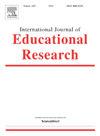Standard curriculum learning efficacy of Tibetan students: The interactive effect of multicultural environment and self-related factors
IF 2.6
3区 教育学
Q1 EDUCATION & EDUCATIONAL RESEARCH
引用次数: 0
Abstract
This study aims to explore the educational effect of a multicultural environment, namely Tibetan Buddhist culture, Tibetan folk culture and Han culture, on the standard curriculum learning efficacy of Tibetan adolescents and the roles in which their self-related factors, psychological capital and self-cognition. A questionnaire was conducted among 1128 Sichuan Province Tibetan primary and middle school students. It was found that multi-cultures did not directly affect Tibetan students’ standard curriculum learning efficacy. However, they indirectly affected learning efficacy through the completely mediating roles of psychological capital and self-cognition of Tibetan students. Psychological capital and self-cognition have serial mediating effects on the relationship between multi-cultures and learning efficacy. This study explored the influence of multi-culture and self-factors on the learning effectiveness of ethnic minority students, proving that minority culture plays an irreplaceable and unique role in students’ self-development and learning, which has important implications for the development of compulsory education in minority areas.
求助全文
约1分钟内获得全文
求助全文
来源期刊

International Journal of Educational Research
EDUCATION & EDUCATIONAL RESEARCH-
CiteScore
6.20
自引率
3.10%
发文量
141
审稿时长
21 days
期刊介绍:
The International Journal of Educational Research publishes regular papers and special issues on specific topics of interest to international audiences of educational researchers. Examples of recent Special Issues published in the journal illustrate the breadth of topics that have be included in the journal: Students Perspectives on Learning Environments, Social, Motivational and Emotional Aspects of Learning Disabilities, Epistemological Beliefs and Domain, Analyzing Mathematics Classroom Cultures and Practices, and Music Education: A site for collaborative creativity.
 求助内容:
求助内容: 应助结果提醒方式:
应助结果提醒方式:


